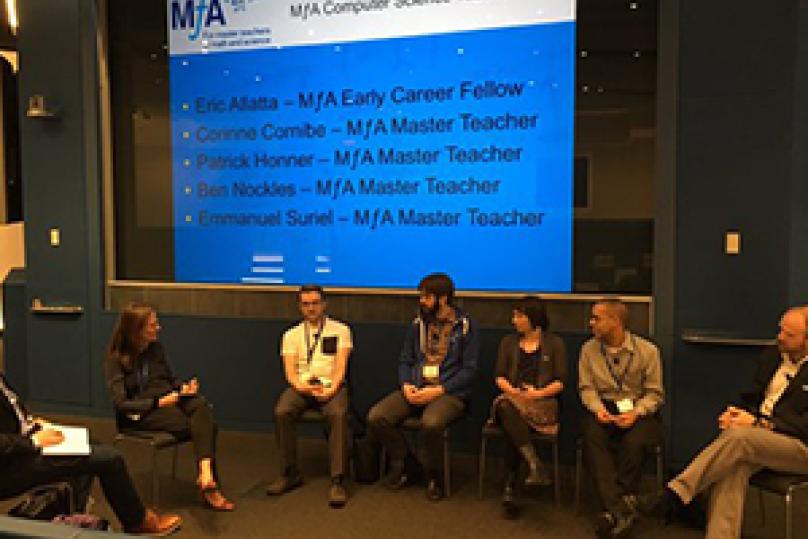
On April 18th we hosted our first event focused solely on computer science – MƒA Teachers Speak Up: Computer Science in NYC, an in-depth panel discussion that focused on teaching computer science in New York City schools. Moderated by MƒA Executive Director Megan Roberts and CSNYC Executive Director Michael Preston, the panel was comprised of five MƒA teachers who teach computer science, including Eric Allatta, Corinne Cornibe, Patrick Honner, Ben Nockles, and Emmanuel Suriel.
The panel discussion kicked off with MƒA teachers sharing how they ended up teaching computer science. Because there is no teacher licensure for computer science in NYC, each panelist highlighted their unique path to teaching the subject. We learned that many of them were asked to fill the role of a computer science teacher based on their own independent computer science knowledge.
The conversation turned to access to computer science and the Computer Science for All initiative, a topic that MƒA Executive Director Megan Roberts also explored in an opinion piece on the EdWeek Blog. In response to a question about what needs to change in schools in order for all students to take computer science, Eric Allatta shared his feelings on why computer science shouldn’t be an opt-in program. “Access to computer science is not the same as computer science for all. It must be a required class to reach all students,” he said. “Once computer science becomes an opt-in program, it excludes a certain population because they don’t see themselves doing computer science and therefore they won’t opt-in.
Expanding on Eric’s thoughts, Emmanuel Suriel said that he believes everything needs to change in order for all students to take computer science – from school schedules to teachers to infrastructure. Ben Nockles echoed that sentiment, saying “We need computers that work, Wi-Fi that’s reliable, a curriculum, and teachers."
Panel participants also discussed what computer science curriculum does and should look like, specifically referencing MƒA President John Ewing’s Huffington Post opinion piece on keeping computer science from becoming focused strictly on coding. The panel participants agreed that computer science entails much more than coding, but that coding needs to come first; they saw coding as a great way to interest students and allow them to understand what they can create through computer science. Panelists also drew the comparison of coding versus computer science being the same as arithmetic versus math and language versus literature – one comprises the other and it’s necessary to create a complete understanding of the entire concept.
Panelists discussed the enormous applicability that computer science has on students’ lives. “Computer science pulls back the curtain for their technology-rich lives,” Corinne Cornibe said. “Students can see that it’s not magic – it’s math.” Patrick Honner elaborated on this point: “Computer science can be a way of making sure students are smart consumers, not consumed by technology.”
In addition to exploring what computer science curriculum should look like, the panelists also debated what computer science assessment should entail. Some argued that more rigorous assessment methods can be a way to ensure a quality curriculum, while helping to validate computer science as a respected course. Others disagreed, saying that too much assessment may be restrictive when it comes to the amount of creativity within a computer science curriculum. In all, panelists agreed that the current AP Computer Science exam style of pencil and paper is outdated and should instead be transferred to a computer to mimic the true nature of computer science.
The panelists also discussed the role of computer science in school as a whole and agreed that while interdisciplinary integration is important, there still needs to be subject-specific computer science teachers who know their content.
The panel took questions from the audience, addressing inquiries about how to get girls into computer science and how to apply computer science to younger grades. Panel participants and attendees then broke out into an open space meeting, a session in which attendees themselves decide which topics to investigate in smaller groups. In these smaller groups, attendees focused on topics such as Maker Spaces, robotics, design thinking, and more, and contributed to the discussion of making Computer Science for All a reality in their classrooms and schools.